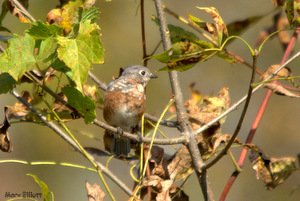Julie Zickefoose is a bird person. I tender that characterization, not tongue-in-cheek, but in all sincerity and as an honorific. Indeed, she herself is certain that the young orphan chicks for which she cares, consider her their mother.
In The Bluebird Effect – Uncommon Bonds with Common Birds, she relates her observations of many years rehabilitating birds and raising newborns and nestlings. She parents them with a broad knowledge of each species’ specific requirements. Although she does not claim professional veterinary or ornithology credentials, she utilizes all the exacting maneuvers needed to examine an injured bird and determine which particular muscle or bone is damaged. If there was a likely assailant (cat, fox), she knows the type of injury to look and test for. And yes, she’ll know just how to set the wing or leg, often using household items.
 a juvenile Eastern Bluebird at Bomoseen State ParkI was also struck by her patience. The young chicks require more care than her own two children, Phoebe and Liam, with feedings at twenty-minute intervals. Concocting multi-ingredient omelets (her term) to feed the chicks, is her first duty upon arising. And as humans would make their choice of cut of beef (tenderloin, flank, ribs), she is well-versed in the selective mealworm parts preferred by her fastidious dependents.
a juvenile Eastern Bluebird at Bomoseen State ParkI was also struck by her patience. The young chicks require more care than her own two children, Phoebe and Liam, with feedings at twenty-minute intervals. Concocting multi-ingredient omelets (her term) to feed the chicks, is her first duty upon arising. And as humans would make their choice of cut of beef (tenderloin, flank, ribs), she is well-versed in the selective mealworm parts preferred by her fastidious dependents.
Her aim in these endeavors, and in writing the book, was not only to give her best effort toward bird restoration, but also to learn from those birds under her care. To fully encompass this objective, she has created drawings and watercolors of the chicks as they healed, matured, and fledged. I was particularly moved by the paintings of feeble newborns, in which Julie’s glazes of maroon, mauve and dull ochre manifest watercolor as the perfect medium for depicting the chicks, limpid, translucent skin.
This delightful, yet serious, book is a confluence of science and soul. Julie Zickefoost has the skills and knowledge to attend to the physical needs of her subjects, yet she recognizes the individual personality in each. She triumphs upon discovering, perched, on their favorite backyard branch, her previous summer’s fledglings. After a winter’s migration, they have found their way back home. Conversely, she is not above expressing profound grief at chick failures and death.
This book is available at the Rutland Free Library.